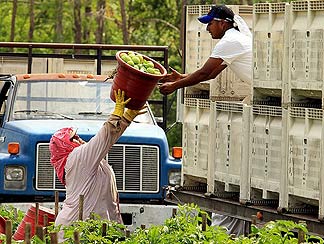
Federal prosecutors say workers picking tomatoes locked in trucks, chained, beaten by bosses for trying to escape; Four arrested
November 20th was a momentous day in Immokalee.
On November 20th, according to court documents filed last week, three tomato pickers made their way to the Collier County Sheriff’s office after having escaped two days earlier through the ventilation hatch of a box truck where they had been held against their will by their employer. The three men told police of an Immokalee-based tomato harvesting slavery ring in which workers “were beaten and forced to work exclusively for the Navarrete family,” according to an article entitled, “Family accused of enslaving workers at Immokalee camp” in the Naples Daily News (12/7/07).
On that same day, November 20th, Andre Raghu, global managing director with the supply chain monitoring group “Intertek,” told the readers of the Miami Herald that his company’s audits of Florida tomato operations “have found no slave labor.” Mr. Raghu was quoted in the Herald as part of a high-profile press junket organized by Burger King and their new partners in public relations, the Florida Tomato Growers Exchange (FTGE), to counter CIW claims of a human rights crisis in Florida’s tomato fields.
And so, on November 20th, while well-paid executives assured the world that all is well in the Florida’s fields, workers in Immokalee were recounting to Sheriff’s deputies how they had to break out of a locked U-Haul truck to escape from their employers.
More on the latest slavery investigation: Federal prosecutors filed charges last week in a case in which farmworkers picking tomatoes in the Immokalee area say their bosses “beat them and chained their hands to keep them from leaving and finding other jobs.” The criminal complaint went on to describe the workers’ inhumane living conditions, saying workers were “locked in box trucks, crates and sheds,” by their bosses. Following the charges, authorities arrested four members of an Immokalee-based farm labor operation.
According to press reports, the initial tip was lodged with deputies from the Collier County Sheriff’s department by workers who had been locked in a van but had managed to escape. In speaking about the case to the local press, Chief Assistant US Attorney Doug Molloy is quoted as saying, “The thing that’s most disturbing is the living conditions and the threat of force,” adding that “the investigation is continuing and more serious charges relating to human slavery could be filed.”
 The charges underscore the disturbing persistence of inhumane, often brutal, conditions – up to and including modern-day slavery – faced by all too many workers who harvest this state’s crops. Earlier this year farm labor contractor Ron Evans was sentenced to thirty years in federal prison, holding workers in what prosecutors called “a form of servitude that is morally and legally reprehensible” in the area of Palatka, Florida.
The charges underscore the disturbing persistence of inhumane, often brutal, conditions – up to and including modern-day slavery – faced by all too many workers who harvest this state’s crops. Earlier this year farm labor contractor Ron Evans was sentenced to thirty years in federal prison, holding workers in what prosecutors called “a form of servitude that is morally and legally reprehensible” in the area of Palatka, Florida.
The new investigation also comes just days after a representative from the supply chain monitoring group “Intertek” effectively declared Immokalee free of modern-day slavery.
The clean bill of health issued by Intertek was announced as part of a high-profile press junket to Immokalee — staged by Burger King. Whether intentionally or not, the statement suggested a repudiation of claims that modern-day slavery continues to be a problem in Florida’s fields, despite multiple federal prosecutions in the past decade landing ten separate farm employers behind bars. The Miami Herald story is posted prominently on the Florida Tomato Growers’ Exchange (FTGE) website, along with the following introduction:
“Brown [Reggie Brown, FTGE spokesperson] and his members have gone on the offensive, fighting back against the charges leveled against them by the Coalition of Immokalee Workers. While there have been a select number of incidents of abuse, the tomato growers feel that their industry has been unfairly accused of abuses.”
The irresponsibility, not to mention inaccuracy, of that position could not now be more obvious. But while industry representatives like the FTGE and Burger King are apparently blinded to the truth by their self-interest (albeit misguided), professional auditing groups like Intertek — aware of the shortcomings of their monitoring protocols and the imperfect nature of their knowledge — should not allow themselves to be used in the public relations battles of an industry with such an indisputably wretched track record.
As for Burger King… The latest news of another possible slavery case in Immokalee would be ironic, if it weren’t so horribly frustrating – and predictable. CIW member Lucas Benitez addressed Burger King shareholders on November 29th, saying:
“Last week, my colleagues and I were flown to London to receive the 2007 Anti-Slavery International award for our work in uncovering and helping to prosecute five farmworker slavery operations, involving more than 1,000 people held against their will by their employers, in Florida´s fields in the last decade. These cases belie your management’s claim that all is well in the fields of Florida. But instead of accepting our invitation to work together to address the reality of modern-day slavery in Florida, and the sweatshop conditions that give rise to it, your CEO has opted to fight us by partnering with the most conservative elements of the very industry in which these slavery cases continue to flourish.”
And what was the response of Burger King CEO John Chidsey? “We are comfortable with our position.” The sound of the next slavery case could almost be heard ticking away in the background.
 How much longer? How much longer will Burger King continue to bury its head in the sand? How many more cases of outrageous abuse must be uncovered before Burger King decides to join the fight against exploitation… not against the workers who are leading that fight?
How much longer? How much longer will Burger King continue to bury its head in the sand? How many more cases of outrageous abuse must be uncovered before Burger King decides to join the fight against exploitation… not against the workers who are leading that fight?
At the very least, this latest news should give Burger King pause the next time company executives think about organizing a day trip to Immokalee to “debunk the myth of farmworker poverty,” or declaring that, as BK spokesperson Keva Silversmith recently did, “Florida growers have a right to run their business how they see fit.“
To stand in the face of ever-mounting evidence to the contrary and claim that farmworkers earn middle-class wages and enjoy modern working conditions is an insult to the men and women who actually have to live and work as farmworkers. Those workers daily suffer poverty and abuse in Florida’s fields that Burger King executives will never know.
If, as it claims, Burger King really does care about conditions in the fields it should join with Yum Brands and McDonald’s in supporting their agreements with the CIW. At some point, the absurdity of fast-food executives organizing press events to declare the fields slavery-free — only to have the latest slavery case explode in their faces before the ink is dry on their press release — becomes harmful to Burger King’s own image. If, instead, Burger King executives can finally muster the decency to join their fast-food colleagues in the effort to modernize Florida agriculture, they can still salvage some semblance of dignity, both for their own brand and for the workers whose undervalued labor helps make that brand so rich.
